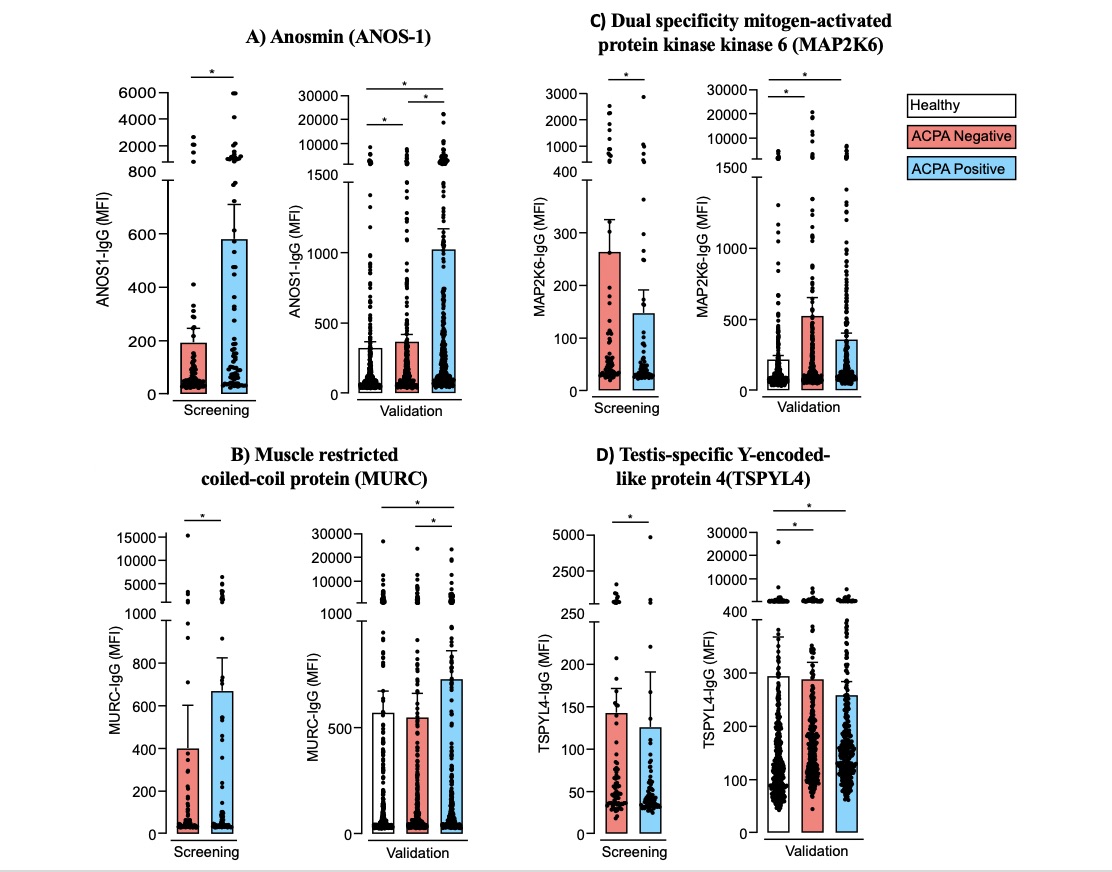Session Information
Session Type: Poster Session C
Session Time: 9:00AM-11:00AM
Background/Purpose: Rheumatoid arthritis (RA) is associated with the presence of autoantibodies being the anti-citrullinated protein antibodies (ACPAs) the hallmark as they are present in almost 70% of patients with established RA. However, despite the high diagnostic value of ACPA, the sensitivity in early RA of the most common tests used in clinics is between 60-70% in newly diagnosed RA. Besides, ACPA-negative patients, who constitute up to one-third of patients with RA, entails a challenge for early diagnosis. The fact that not all RA patients are ACPA-positive means that there is a need for additional biomarkers including autoantibodies that may help to diagnose RA patients at an early stage.
Interestingly, ACPA-positive RA patients also display a different etiology and disease course compared to ACPA-negative patients. Therefore, an increased knowledge about the presence of other circulating autoantibodies related with early RA is needed to improve its diagnosis, specifically for ACPA-negative patients, and to better understand the pathogenic mechanisms underlying the different RA subsets.
Herein we aimed to search for plasma autoantibodies associated with ACPA status that could be useful to define clinical phenotypes in early RA.
Methods: The autoantibody repertoire of 80 ACPA-negative and 80 ACPA-positive early RA subjects from the Swedish population-based Epidemiological Investigation of RA (EIRA) cohort was screened using a targeted suspension bead array built on protein fragments earlier described as autoimmunity targets. Four autoantibodies were validated in another set of EIRA samples containing 317 ACPA-positive, 302 ACPA-negative and 372 age- and sex-matched controls. The relationship between the four autoantibodies and lung abnormalities on high-resolution computed tomography was also examined in 93 early RA patients. Association between the autoantibodies and clinical features was assessed by logistic regression analysis.
Results: IgG autoantibody levels towards anosmin-1 (ANOS-1) and towards muscle related coiled-coil protein (MURC) were significantly increased in ACPA-positive subjects compared to ACPA-negative and controls, and associated with ACPA status (OR=3.02; 95% CI 1.86 to 4.89; and OR=1.86; 95% CI 1.16 to 2.97, respectively). IgG autoantibody levels towards dual specificity mitogen-activated protein kinase kinase 6 (MAP2K6), and testis-specific Y-encoded-like protein 4 (TSPYL4) were increased in the ACPA-negative subjects compared to ACPA-positive and controls. IgG anti-TSPYL4 was also significantly associated with ACPA-negative status (OR=0.41;95%CI 0.19 to 0.89). IgG anti-ANOS1 was associated with the smoking habit (OR=2.11;95% CI 1.22 to 3.67) and IgG anti-MURC with the presence of the shared-epitope (OR=1.95;95% CI 1.11 to 3.46). Regarding lung abnormalities, the presence of IgG anti-TSPYL4 was associated with a less prevalence of infiltrates (OR=0.11;95% CI 0.01 to 0.86), and IgG anti-MAP2K6 with less fibrosis (RR=0.85;95% CI 0.77 to 0.94).
Conclusion: Our data suggest that these four autoantibodies may be potentially useful to define clinical phenotypes of RA.Validation in other early RA sample cohorts is needed.
To cite this abstract in AMA style:
Lourido L, Joshua V, Hansson M, Sjöberg R, Pin E, Ruiz-Romero C, Nilsson P, Klareskog L, Blanco F. Identification of Circulating Autoantibodies Associated with ACPA Status in Early Rheumatoid Arthritis [abstract]. Arthritis Rheumatol. 2023; 75 (suppl 9). https://acrabstracts.org/abstract/identification-of-circulating-autoantibodies-associated-with-acpa-status-in-early-rheumatoid-arthritis/. Accessed .« Back to ACR Convergence 2023
ACR Meeting Abstracts - https://acrabstracts.org/abstract/identification-of-circulating-autoantibodies-associated-with-acpa-status-in-early-rheumatoid-arthritis/

